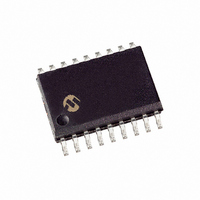PIC18F1320-I/SO Microchip Technology, PIC18F1320-I/SO Datasheet - Page 115

PIC18F1320-I/SO
Manufacturer Part Number
PIC18F1320-I/SO
Description
IC MCU FLASH 4KX16 A/D 18SOIC
Manufacturer
Microchip Technology
Series
PIC® 18Fr
Datasheets
1.PIC16F616T-ISL.pdf
(8 pages)
2.PIC18F1220-ISO.pdf
(308 pages)
3.PIC18F1220-ISO.pdf
(8 pages)
4.PIC18F1220-ISO.pdf
(6 pages)
5.PIC18F1220-ISO.pdf
(10 pages)
6.PIC18F1220-ISO.pdf
(4 pages)
7.PIC18F1320-ISS.pdf
(36 pages)
8.PIC18F1220-EP.pdf
(310 pages)
Specifications of PIC18F1320-I/SO
Program Memory Type
FLASH
Program Memory Size
8KB (4K x 16)
Package / Case
18-SOIC (7.5mm Width)
Core Processor
PIC
Core Size
8-Bit
Speed
40MHz
Connectivity
UART/USART
Peripherals
Brown-out Detect/Reset, LVD, POR, PWM, WDT
Number Of I /o
16
Eeprom Size
256 x 8
Ram Size
256 x 8
Voltage - Supply (vcc/vdd)
4.2 V ~ 5.5 V
Data Converters
A/D 7x10b
Oscillator Type
Internal
Operating Temperature
-40°C ~ 85°C
Processor Series
PIC18F
Core
PIC
Data Bus Width
8 bit
Data Ram Size
256 B
Interface Type
EUSART
Maximum Clock Frequency
40 MHz
Number Of Programmable I/os
16
Number Of Timers
4
Operating Supply Voltage
2 V to 5.5 V
Maximum Operating Temperature
+ 85 C
Mounting Style
SMD/SMT
3rd Party Development Tools
52715-96, 52716-328, 52717-734, 52712-325, EWPIC18
Development Tools By Supplier
PG164130, DV164035, DV244005, DV164005, PG164120, ICE2000, ICE4000, DM163014, DV164136
Minimum Operating Temperature
- 40 C
On-chip Adc
7-ch x 10-bit
Lead Free Status / RoHS Status
Lead free / RoHS Compliant
For Use With
DVA12XP080 - ADAPTER DEVICE FOR MPLAB-ICEAC164010 - MODULE SKT PROMATEII DIP/SOIC
Lead Free Status / Rohs Status
Lead free / RoHS Compliant
Available stocks
Company
Part Number
Manufacturer
Quantity
Price
Company:
Part Number:
PIC18F1320-I/SO
Manufacturer:
MICROCHIP
Quantity:
35 000
Part Number:
PIC18F1320-I/SO
Manufacturer:
MICROCHIP/微芯
Quantity:
20 000
- PIC16F616T-ISL PDF datasheet
- PIC18F1220-ISO PDF datasheet #2
- PIC18F1220-ISO PDF datasheet #3
- PIC18F1220-ISO PDF datasheet #4
- PIC18F1220-ISO PDF datasheet #5
- PIC18F1220-ISO PDF datasheet #6
- PIC18F1320-ISS PDF datasheet #7
- PIC18F1220-EP PDF datasheet #8
- Current page: 115 of 310
- Download datasheet (6Mb)
14.2
The Timer1 oscillator may be used as the clock source
for Timer3. The Timer1 oscillator is enabled by setting
the T1OSCEN (T1CON<3>) bit. The oscillator is a low-
power oscillator rated for 32 kHz crystals. See
Section 12.2 “Timer1 Oscillator” for further details.
14.3
The TMR3 register pair (TMR3H:TMR3L) increments
from 0000h to FFFFh and rolls over to 0000h. The
TMR3 interrupt, if enabled, is generated on overflow,
which is latched in interrupt flag bit, TMR3IF
(PIR2<1>). This interrupt can be enabled/disabled by
setting/clearing TMR3 Interrupt Enable bit, TMR3IE
(PIE2<1>).
TABLE 14-1:
2004 Microchip Technology Inc.
INTCON
PIR2
PIE2
IPR2
TMR3L
TMR3H
T1CON
T3CON
Legend:
Name
Timer1 Oscillator
Timer3 Interrupt
Holding Register for the Least Significant Byte of the 16-bit TMR3 Register
Holding Register for the Most Significant Byte of the 16-bit TMR3 Register
OSCFIF
OSCFIE
OSCFIP
x = unknown, u = unchanged, – = unimplemented, read as ‘0’. Shaded cells are not used by the Timer3 module.
GIEH
RD16
RD16
Bit 7
GIE/
REGISTERS ASSOCIATED WITH TIMER3 AS A TIMER/COUNTER
T1RUN
PEIE/
Bit 6
GIEL
—
—
—
—
T1CKPS1 T1CKPS0 T1OSCEN T1SYNC
T3CKPS1 T3CKPS0
TMR0IE
Bit 5
—
—
—
INT0IE
EEIF
EEIE
EEIP
Bit 4
T3CCP1
RBIE
Bit 3
—
—
—
T3SYNC
TMR0IF
14.4
If the CCP module is configured in Compare mode
to
(CCP1M3:CCP1M0 = 1011), this signal will reset
Timer3. See Section 15.4.4 “Special Event Trigger”
for more information.
Timer3 must be configured for either Timer or Synchro-
nized Counter mode to take advantage of this feature.
If Timer3 is running in Asynchronous Counter mode,
this Reset operation may not work. In the event that a
write to Timer3 coincides with a special event trigger
from CCP1, the write will take precedence. In this mode
of operation, the CCPR1H:CCPR1L register pair
effectively becomes the period register for Timer3.
LVDIE
LVDIP
LVDIF
Bit 2
Note:
generate
Resetting Timer3 Using a CCP
Trigger Output
PIC18F1220/1320
TMR1CS TMR1ON 0000 0000 u0uu uuuu
TMR3CS TMR3ON 0-00 0000 u-uu uuuu
TMR3IF
TMR3IE
TMR3IP
INT0IF
Bit 1
The special event triggers from the CCP
module will not set interrupt flag bit,
TMR3IF (PIR1<0>).
a
RBIF
Bit 0
—
—
—
“special
0000 000x 0000 000u
0--0 -00- 0--0 -00-
0--0 -00- 0--0 -00-
1--1 -11- 1--1 -11-
xxxx xxxx uuuu uuuu
xxxx xxxx uuuu uuuu
POR, BOR
Value on
DS39605C-page 113
event
Value on
all other
Resets
trigger”
Related parts for PIC18F1320-I/SO
Image
Part Number
Description
Manufacturer
Datasheet
Request
R

Part Number:
Description:
20-Pin USB Flash Microcontrollers
Manufacturer:
MICROCHIP [Microchip Technology]
Datasheet:

Part Number:
Description:
PIC18F With 128-segment LCD Driver And 12-bit ADC, 8KB Flash, 768B RAM, CCP, MSS
Manufacturer:
Microchip Technology
Datasheet:

Part Number:
Description:
PIC18F With 128-segment LCD Driver And 12-bit ADC, 16KB Flash, 768B RAM, CCP, MS
Manufacturer:
Microchip Technology
Datasheet:

Part Number:
Description:
PIC18F With 192-segment LCD Driver And 12-bit ADC, 8KB Flash, 768B RAM, CCP, MSS
Manufacturer:
Microchip Technology
Datasheet:

Part Number:
Description:
PIC18F With 192-segment LCD Driver And 12-bit ADC, 16KB Flash, 768B RAM, CCP, MS
Manufacturer:
Microchip Technology
Datasheet:

Part Number:
Description:
Microcontrollers (MCU) 48KB 3328 RAM 52 I/O
Manufacturer:
Microchip Technology
Datasheet:

Part Number:
Description:
Microcontrollers (MCU) 64KB 3328 RAM 52 I/O
Manufacturer:
Microchip Technology
Datasheet:

Part Number:
Description:
32kB Flash, 2kB RAM, 1kB EE, NanoWatt XLP, LCD 64 QFN 9x9x0.9mm T/R
Manufacturer:
Microchip Technology
Datasheet:

Part Number:
Description:
32kB Flash, 2kB RAM, 1kB EE, NanoWatt XLP, LCD 64 TQFP 10x10x1mm T/R
Manufacturer:
Microchip Technology
Datasheet:

Part Number:
Description:
128kB Flash, 4kB RAM, 1kB EE, 16MIPS, NanoWatt XLP, LCD, 5V 80 TQFP 12x12x1mm T/
Manufacturer:
Microchip Technology
Datasheet:

Part Number:
Description:
32kB Flash, 2kB RAM, 1kB EE, NanoWatt XLP, LCD 64 QFN 9x9x0.9mm TUBE
Manufacturer:
Microchip Technology
Datasheet:

Part Number:
Description:
32kB Flash, 2kB RAM, 1kB EE, NanoWatt XLP, LCD 64 TQFP 10x10x1mm TRAY
Manufacturer:
Microchip Technology

Part Number:
Description:
128kB Flash, 4kB RAM, 1kB EE, 16MIPS, NanoWatt XLP, LCD, 5V 80 TQFP 12x12x1mm TR
Manufacturer:
Microchip Technology












